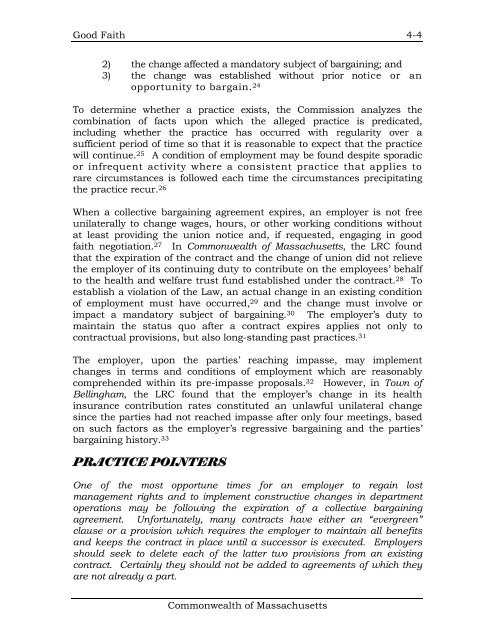Management Rights - AELE's Home Page
Management Rights - AELE's Home Page
Management Rights - AELE's Home Page
You also want an ePaper? Increase the reach of your titles
YUMPU automatically turns print PDFs into web optimized ePapers that Google loves.
Good Faith 4-4<br />
2) the change affected a mandatory subject of bargaining; and<br />
3) the change was established without prior notice or an<br />
opportunity to bargain. 24<br />
To determine whether a practice exists, the Commission analyzes the<br />
combination of facts upon which the alleged practice is predicated,<br />
including whether the practice has occurred with regularity over a<br />
sufficient period of time so that it is reasonable to expect that the practice<br />
will continue. 25 A condition of employment may be found despite sporadic<br />
or infrequent activity where a consistent practice that applies to<br />
rare circumstances is followed each time the circumstances precipitating<br />
the practice recur. 26<br />
When a collective bargaining agreement expires, an employer is not free<br />
unilaterally to change wages, hours, or other working conditions without<br />
at least providing the union notice and, if requested, engaging in good<br />
faith negotiation. 27 In Commonwealth of Massachusetts, the LRC found<br />
that the expiration of the contract and the change of union did not relieve<br />
the employer of its continuing duty to contribute on the employees’ behalf<br />
to the health and welfare trust fund established under the contract. 28 To<br />
establish a violation of the Law, an actual change in an existing condition<br />
of employment must have occurred, 29 and the change must involve or<br />
impact a mandatory subject of bargaining. 30 The employer’s duty to<br />
maintain the status quo after a contract expires applies not only to<br />
contractual provisions, but also long-standing past practices. 31<br />
The employer, upon the parties’ reaching impasse, may implement<br />
changes in terms and conditions of employment which are reasonably<br />
comprehended within its pre-impasse proposals. 32 However, in Town of<br />
Bellingham, the LRC found that the employer’s change in its health<br />
insurance contribution rates constituted an unlawful unilateral change<br />
since the parties had not reached impasse after only four meetings, based<br />
on such factors as the employer’s regressive bargaining and the parties’<br />
bargaining history. 33<br />
PRACTICE POINTERS<br />
One of the most opportune times for an employer to regain lost<br />
management rights and to implement constructive changes in department<br />
operations may be following the expiration of a collective bargaining<br />
agreement. Unfortunately, many contracts have either an “evergreen”<br />
clause or a provision which requires the employer to maintain all benefits<br />
and keeps the contract in place until a successor is executed. Employers<br />
should seek to delete each of the latter two provisions from an existing<br />
contract. Certainly they should not be added to agreements of which they<br />
are not already a part.<br />
Commonwealth of Massachusetts
















